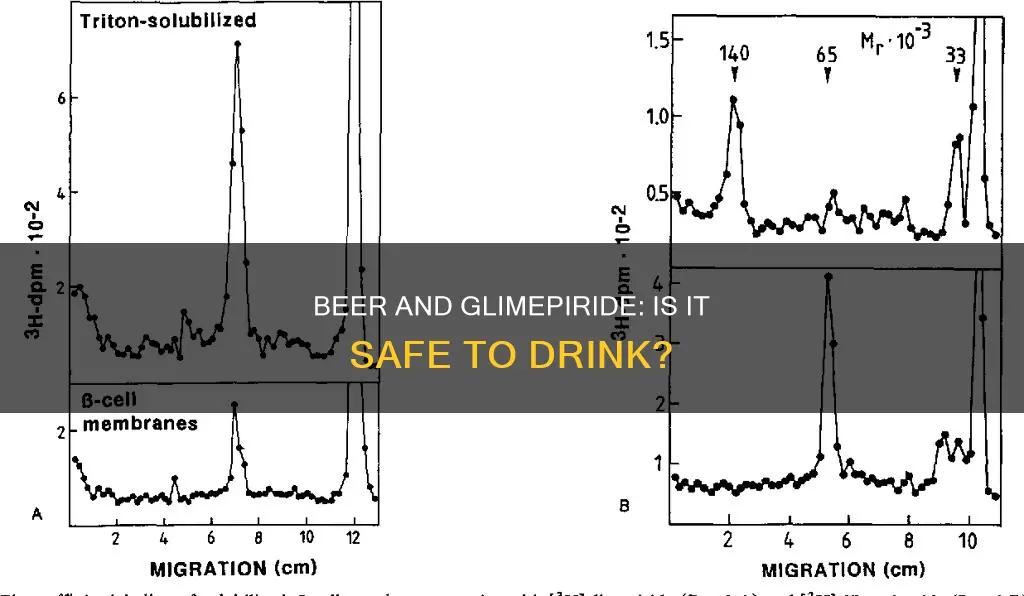
Glimepiride is an oral prescription drug used to control blood glucose levels in people with type 2 diabetes. It can be used alongside other oral diabetes medications or insulin drugs to regulate blood sugar levels. When considering drinking alcohol while taking glimepiride, it is important to understand the potential interactions and risks. Alcohol can affect blood glucose levels, potentially leading to hypoglycemia (low blood sugar) or hyperglycemia (high blood sugar), depending on consumption patterns. It is recommended to consult a doctor about alcohol intake, especially if diabetes is not well-controlled or if there are other health concerns such as high triglycerides, neuropathy, or pancreatitis. While moderate alcohol consumption may not significantly affect blood glucose levels in controlled diabetes, limiting intake and avoiding drinking on an empty stomach or after exercise are generally advised to minimise risks.
What You'll Learn
- Glimepiride is a prescription drug that helps control blood glucose levels in type 2 diabetes patients
- Alcohol consumption may cause hypoglycemia or hyperglycemia, depending on the amount and frequency
- Diabetics with neuropathy, high triglycerides, or pancreatitis should avoid alcohol while on glimepiride
- One drink per day for women and two for men is generally considered moderate consumption
- Always consult a doctor before combining alcohol with any medication

Glimepiride is a prescription drug that helps control blood glucose levels in type 2 diabetes patients
Glimepiride is typically taken as an oral tablet once a day with breakfast or the first main meal. It is important to follow the directions on the prescription label and take glimepiride exactly as directed by a doctor. The medication helps control blood sugar but does not cure diabetes, so patients should continue taking it even if they feel well.
Glimepiride may cause side effects such as low blood sugar (hypoglycemia), which can lead to symptoms like trembling, nervousness, lightheadedness, fast heart rate, and fatigue. More severe side effects may include severe low blood sugar, hypersensitivity reactions, liver damage, and low sodium levels. It is important to monitor blood sugar levels regularly while taking glimepiride and be aware of the symptoms of low and high blood sugar.
In addition to its effects on blood sugar, glimepiride may also interact with alcohol. Alcohol can affect blood glucose levels in patients with diabetes, potentially causing hypoglycemia or hyperglycemia. It is generally recommended to limit alcohol intake to one drink per day for women and two drinks per day for men when consuming alcohol with glimepiride. However, it is important to consult a doctor for specific recommendations and to discuss all medications and supplements being taken.
Beer and Worker Stamina: Is There a Link?
You may want to see also

Alcohol consumption may cause hypoglycemia or hyperglycemia, depending on the amount and frequency
Alcohol consumption can affect blood sugar levels, and for people with diabetes, this can be particularly dangerous. The liver is responsible for keeping blood sugar within typical limits. When a person consumes alcohol, the liver may neglect blood sugar level maintenance in favour of breaking down alcohol. This can lead to hypoglycemia or hyperglycemia, depending on how much and how often a person drinks.
Hypoglycemia, or low blood sugar, is more likely to occur when alcohol is consumed on an empty stomach or when blood sugar levels are already low. The liver, which usually stabilises blood sugar levels, will prioritise metabolising alcohol over maintaining blood sugar levels. This can lead to a dangerous drop in blood sugar levels, especially for those with diabetes.
On the other hand, long-term alcohol consumption in well-nourished individuals with diabetes can result in hyperglycemia, or high blood sugar levels. This is because excessive alcohol use can reduce the effectiveness of insulin over time, leading to higher blood sugar levels.
It is important to note that the symptoms of hypoglycemia, such as slurred speech, drowsiness, and confusion, can be similar to the signs of intoxication, making it challenging to distinguish between the two conditions. Therefore, it is recommended to avoid drinking alcohol on an empty stomach and to monitor blood sugar levels regularly, especially for those with diabetes.
Do LCBO Gift Cards Work at Beer Store?
You may want to see also

Diabetics with neuropathy, high triglycerides, or pancreatitis should avoid alcohol while on glimepiride
Alcohol can affect blood glucose levels in patients with diabetes, causing both hypoglycemia (low blood sugar) and hyperglycemia (high blood sugar). The amount and frequency of alcohol consumption can determine which of these two effects is more likely to occur. Diabetics with neuropathy, high triglycerides, or pancreatitis should avoid alcohol while on glimepiride. This is because their diabetes is not well-controlled, and alcohol consumption can further complicate their condition.
Neuropathy, or nerve damage, is a common complication of diabetes. It can cause neuropathic pain, which arises from aberrant or incomplete regeneration of damaged nerves. This pain is characterized by hyperalgesia and allodynia, which are enhanced sensitivity to pain and exaggerated pain responses to normal stimuli, respectively. Alcohol consumption can exacerbate this pain and further damage nerves.
High triglycerides are another indicator of uncontrolled diabetes. Alcohol consumption can further increase triglyceride levels, leading to a higher risk of cardiovascular disease and other complications.
Pancreatitis is an inflammation of the pancreas, which is responsible for producing insulin. Alcohol consumption can irritate the pancreas and worsen pancreatitis symptoms, leading to even higher blood sugar levels.
Therefore, it is crucial for diabetics with neuropathy, high triglycerides, or pancreatitis to avoid alcohol while on glimepiride. Doing so will help them manage their blood glucose levels and prevent further complications.
A Beginner's Guide to Joining a Beer Crawl
You may want to see also

One drink per day for women and two for men is generally considered moderate consumption
Drinking alcohol while taking glimepiride can affect blood glucose levels in patients with diabetes. Both hypoglycaemia (low blood sugar) and hyperglycaemia (high blood sugar) may occur, depending on how much and how often you drink.
If your diabetes is not well controlled or if you have high triglycerides, neuropathy (nerve damage), or pancreatitis, you should avoid drinking alcohol. However, if your diabetes is under control, moderate alcohol consumption generally does not affect blood glucose levels.
Moderate alcohol consumption is generally defined as up to one drink per day for women and two drinks per day for men. One drink is equivalent to 5 oz of wine, 12 oz of beer, or 1.5 oz of distilled spirits. It is important to note that drinking alcohol on an empty stomach or after exercise can increase the risk of hypoglycaemia.
The recommendation for moderate alcohol consumption is based on medical studies suggesting that drinking within these limits leads to longer lives. While moderate alcohol consumption has been linked to lower rates of cardiovascular disease, type 2 diabetes, Alzheimer's, and dementia, it is important to note that even small amounts of alcohol are associated with an increased risk of certain types of cancer.
Benadryl and Beer: A Safe Mix?
You may want to see also

Always consult a doctor before combining alcohol with any medication
Alcohol can interact with certain drugs or exacerbate the medical and mental health conditions you're being treated for. To be safe, always consult your doctor or pharmacist first. They can provide personalised guidance based on your specific medications and health status.
Alcohol can change how a medication works, and certain drugs can change how you feel the effects of alcohol. Alcohol can make some medications less effective by interfering with how they are absorbed in the digestive tract. In some cases, alcohol increases the bioavailability of a drug, which can raise the concentration of the medication in your blood to toxic levels.
Drinking alcohol can also make the side effects of a medication worse or even cause new symptoms. This is especially true if you are taking a medication that makes you sleepy or causes sedation. More intense side effects mean you might be more impaired after having one drink than you would typically be.
The combination of medication and alcohol can lead to serious health consequences, including overdose and even death. Alcohol can speed up how medication is absorbed and broken down in the body, making it less effective or, in some situations, not effective at all. It can also slow down the absorption and breakdown of medication, increasing levels of the medication in the bloodstream to potentially toxic levels.
Additionally, drinking alcohol can intensify a medication's side effects or create new symptoms such as nausea, vomiting, headaches, and drowsiness. Some medications, like painkillers, cold and allergy medications, and cough syrups, may contain alcohol as an ingredient, which can magnify these effects even further.
If you take glimepiride, a medication for diabetes, alcohol may affect your blood glucose levels. Both hypoglycaemia (low blood sugar) and hyperglycaemia (high blood sugar) may occur, depending on how much and how often you drink. You should avoid using alcohol if your diabetes is not well controlled or if you have high triglycerides, neuropathy (nerve damage), or pancreatitis. Moderate alcohol consumption generally does not affect blood glucose levels if your diabetes is under control. However, it may be best to limit alcohol intake to one drink daily for women and two drinks daily for men.
Beer After a Workout: Good or Bad Idea?
You may want to see also
Frequently asked questions
Alcohol may affect blood glucose levels in patients with diabetes. Depending on how much and how often you drink, both hypoglycemia (low blood sugar) and hyperglycemia (high blood sugar) may occur. It is best to consult your doctor about alcohol consumption while taking glimepiride.
If your diabetes is not well-controlled, or if you have high triglycerides, neuropathy (nerve damage), or pancreatitis, you should avoid drinking alcohol with glimepiride.
Moderate alcohol consumption generally does not affect blood glucose levels if your diabetes is under control. It is recommended to limit alcohol intake to one drink daily for women and two drinks daily for men. One drink is equivalent to 5 oz of wine, 12 oz of beer, or 1.5 oz of distilled spirits.
Avoid drinking alcohol on an empty stomach or after exercising as it may increase the risk of hypoglycemia.
It is important to consult your doctor about any medications you are taking, including vitamins and herbs. Do not stop taking glimepiride without first speaking to your healthcare provider.







